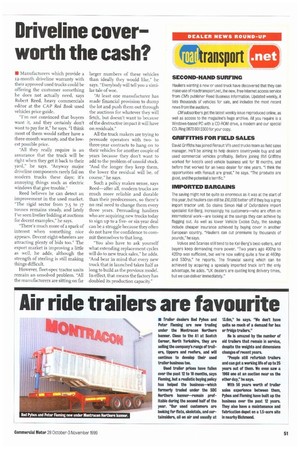Driveline cover worth the cash?
Page 53

If you've noticed an error in this article please click here to report it so we can fix it.
• Manufacturers which provide a 12-month driveline warranty with their approved used trucks could be offering the customer something he does not actually need, says Robert Reed, heavy commercials editor at the CAP Red Book used vehicles price guide.
"I'm not convinced that buyers want it, and they certainly don't want to pay for it," he says. "I think most of them would rather have a three-month warranty, and the lowest possible price.
"All they really require is an assurance that the truck will be right when they get it back to their yard," he says. "Anyway major driveline components rarely fail on modern trucks these days: it's annoying things such as electric windows that give trouble."
Reed believes he can detect an improvement in the used market. "The rigid sector from 7.5 to 17 tonnes remains steady, and lately I've seen livelier bidding at auctions for decent examples," he says.
"There's much more of a spark of interest when something nice appears. Decent eight-wheelers are attracting plenty of bids too." The export market is improving a little as well, he adds, although the strength of sterling is still making things difficult.
However, fleet-spec tractor units remain an unsolved problem. "All the manufacturers are sitting on far larger numbers of these vehicles than ideally they would like," he says. "Everybody will tell you a similar tale of woe.
"At least one manufacturer has made financial provision to dump the lot and push them out through the auctions for whatever they will fetch, but doesn't want to because of the destructive impact it will have on residuals."
All the truck makers are trying to persuade operators with twoto three-year contracts to hang on to their vehicles for another couple of years because they don't want to add to the problem of unsold stock. "And the longer they keep them, the lower the residual will be, of course," he says.
Such a policy makes sense, says Reed—after all, modern trucks are much more reliable and durable than their predecessors, so there's no real need to change them every three years. Persuading hauliers who are acquiring new trucks today to sign up to a fiveor six-year deal can be a struggle because they often do not have the confidence to commit themselves to that long.
"You also have to ask yourself what extending replacement cycles will do to new truck sales," he adds, "And bear in mind that every new truck that is launched takes half as long to build as the previous model. In effect, that means the factory has .doubled its production capacity."
















































































































